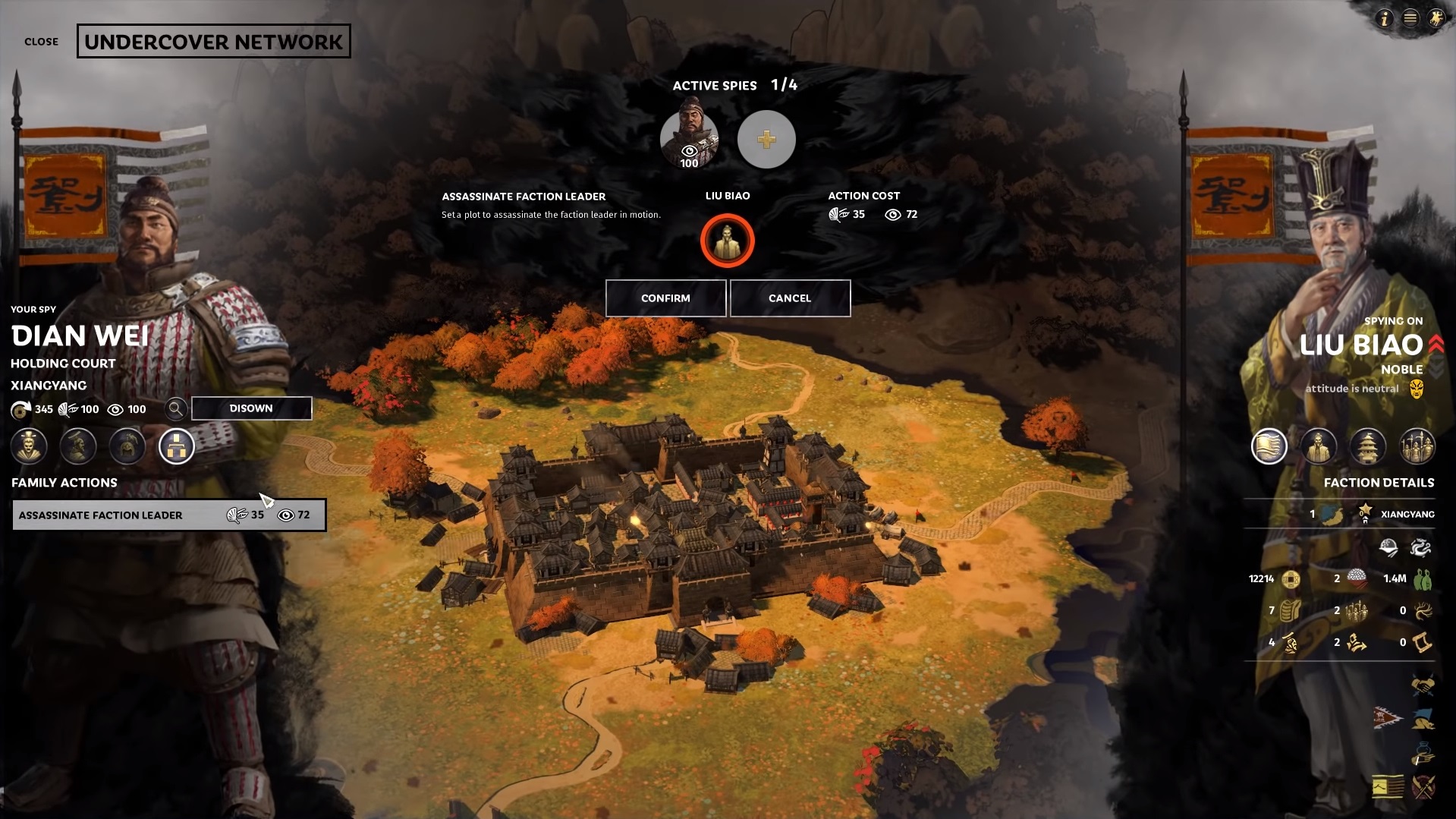Whether in the form of Roman spies sabotaging enemy army camps, or Japanese ninja silently assassinating an enemy daimyo, espionage has played a significant role in the Total War series. Yet while spies and assassins in previous games could be enormously powerful, the series’ overall representation of subterfuge was fairly limited.
This all changes in Total War: Three Kingdoms, which transforms espionage into a complex system that lets your spies infiltrate enemy factions, sow dissent amongst their ranks, secretly assassinate enemy leaders, and even wrest control of factions before handing power over to you. It lets players devise elaborate plots and orchestrate dramatic coup d’états. But you’ll equally need to be vigilant about your own ranks, as enemy warlords will also try to infiltrate your faction, possibly using the same agents you sent to spy on them.
One of the biggest changes to how espionage works is that spies are no longer an official class of unit. All major characters in Three Kingdoms share the same recruitment pool. Any character who possesses the “undercover” trait can be assigned the role of a spy and ordered to infiltrate a specific faction.

At this point, that spy officially departs your faction and returns to the recruitment pool, where the chosen faction can recruit them and use them as a regular unit. What your enemy doesn’t know, of course, is that character only appeared in their recruitment pool, and that once recruited, that character secretly work for you.
Once part of another faction, your spy can perform a wide variety of different tasks, such as destabilising a faction’s military. For example, they can create false marching orders to make an enemy army more susceptible to ambush, divert military supplies to starve an army of food, or outright poison their supplies to diminish their ranks.
More advanced spy actions are dependent upon their current position in the opposing faction. As a court-noble, your spy can attempt to improve your overall diplomatic standing by vocally supporting your faction, increase your spying abilities by extending your undercover network, whisper poison words against other characters in that faction, decreasing their standing, and even encourage generals to break away from their current faction and establish their own dynasty.

As your spy ascend the ranks of the enemy faction, yet more powerful actions become available. If they’re made governor of a specific province, for example, you could order them to open the gates of a settlement, letting your army walk right in and seize control. Alternatively, your spy could instigate a rebel uprising to distract enemy forces, or simply surrender the entire province directly to you.
At the highest level, your spy might be initiated into the faction leader’s family and even be named faction heir, letting them assassinate the leader at take direct control of the entire dynasty. They can then attempt to hand over this power to you, at the cost of triggering a civil war between supporters of the old warlord and those who have pledged to serve your spy.

Pre-purchase Total War: Three Kingdoms here.
Combining a gripping turn-based campaign of empire-building & conquest with stunning real-time battles, THREE KINGDOMS redefines the series in an age of heroes & legends.
Out on the 23rd May.
It’s an enormously powerful system, but it’s a system that your enemies can use too. Just as you’re trying to infiltrate enemy factions, so they will attempt to infiltrate yours. Consequently, you’ll need to weigh your recruitment decisions carefully. If you see a character up for recruitment who has a long affiliation with a hostile faction, there’s a reasonable chance they might be a spy.
Even your own spies are susceptible to subterfuge. When undercover, spies will regularly interrelate with members of the faction they’re spying upon, making new acquaintances and possibly fast friendships. Ultimately, they might decide they like the faction they’re working for more than yours, and defect to the other side.
Meanwhile, every spy action comes with the chance that their identity will be uncovered. If this happens, they may be captured and killed, but the enemy warlord might also release the spy back into your services. A surprising act of mercy? Or has your spy returned to you as a double-agent? You won’t know for sure, and you’ll have to be careful about how you use that agent in the future.
Total War has always let players use espionage to facilitate their military strategy. But in Three Kingdoms, espionage can be your military strategy. Place the right agents in the right factions, and execute the right plans, and you can bring down entire dynasties without ever setting foot on the battlefield.
The biggest gaming news, reviews and hardware deals
Keep up to date with the most important stories and the best deals, as picked by the PC Gamer team.

